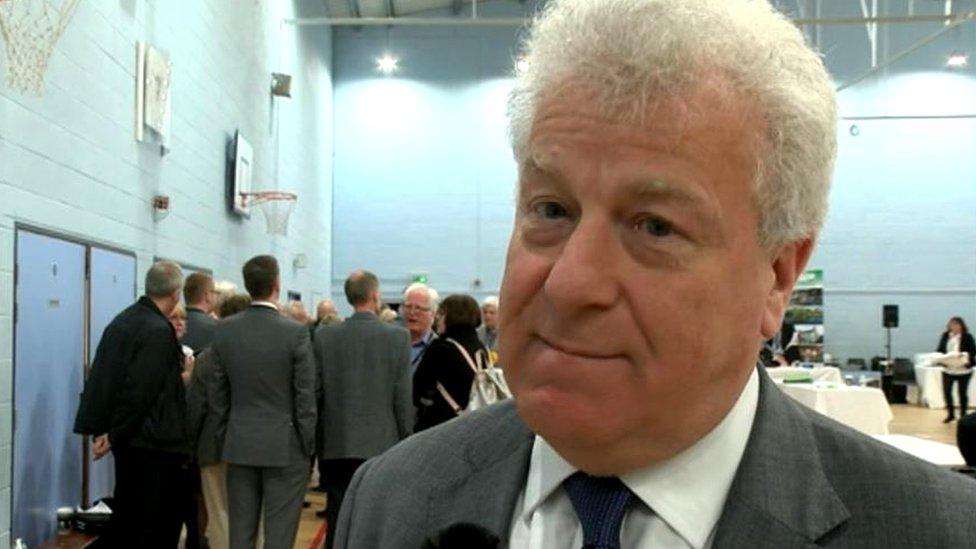Conservative majority on Tandridge council cut to one
- Published

Conservative council leader Martin Fisher said people were not happy with house building targets
The Conservative Party has lost eight seats in Tandridge, reducing its majority on the Surrey council to one seat.
The Tories now have 22 seats on the district council - the exact number needed to maintain a majority.
The losses have been put down partly to concerns over new housing in the district, which is 94% greenbelt.
Alongside the 22 Tories, there are now nine Liberal Democrats, and 11 others.
The Oxted and Limpsfield Residents' Group with Caterham and Lingfield Independents now have six seats, the Independent Group secured two, and there are three independents.
'Not happy'
Conservative leader of the council Martin Fisher said: "I've lost a lot of hardworking, dedicated councillors, which is obviously very sad.
"If I am to criticise the government I would say it's the mixed messages over the greenbelt that are crucifying us.
"People are not happy with the government's house-building targets which were being set."
Sam Gyimah, Conservative MP for East Surrey, tweeted that it was a "tough night in Tandridge on the back of local planning and housing issues".
Allow X content?
This article contains content provided by X. We ask for your permission before anything is loaded, as they may be using cookies and other technologies. You may want to read X’s cookie policy, external and privacy policy, external before accepting. To view this content choose ‘accept and continue’.
Liberal Democrat Jeffrey Gray said he was "thrilled" to take the village of Whyteleafe from the Conservatives.
He added: "Our battle has been about keeping vital services going for local people and I am very pleased we have come out on top with that one."
Councillor Catherine Sayer of the Oxted and Limpsfield Residents' Group said she was "absolutely delighted" to be elected.
"When I was canvassing I found quite a lot of disquiet about how the residents are represented at the moment and I guess the vote is a reflection of that," she said.
The overall voter turnout in the district was 41%.
Down to 10 votes
The balance of power in Woking came down to 10 votes, as the Conservatives kept control of the borough council by the slimmest of majorities.
In the Goldswork Park ward the result came within 10 votes of being taken by the LibDems, which would have left no party in overall control of the authority.
Allow X content?
This article contains content provided by X. We ask for your permission before anything is loaded, as they may be using cookies and other technologies. You may want to read X’s cookie policy, external and privacy policy, external before accepting. To view this content choose ‘accept and continue’.
Woking was one of the five authorities where the government tested a scheme in which voters had to prove their identity before voting.
The scheme, which was being piloted in Bromley, Gosport, Swindon, Watford and Woking was designed to combat voter fraud.
The Electoral Reform Society (ERS) had warned the scheme was "deeply flawed".
Turnout at Woking was 37.75% compared with 38% for the local elections in 2016 and 2017.
The Conservatives faired better in Elmbridge where they gained three seats, while the LibDems gained one - all the the expense of the Residents Association which lost four councillors.
The Conservatives are the largest party, with the same number of councillors as the LibDems and Residents Association combined.
No Surrey UKIP
In Mole Valley, the Conservatives lost their overall control of the council after losing one of their six seats up for re-selection. The LibDems gained one seat.
In Runnymede, the Tories lost three seats without causing much of a dent to their large majority, which still stands at 20.
Labour gained one place on the council, with the Independents adding two more members.
In Reigate and Banstead the Tories and Greens made gains, with the Conservatives increasing their majority.
The LibDems lost one of their two seats and the Residents Association also dropped a seat, but still has six councillors.
UKIP now has no councillors in Surrey after losing its single remaining seats on Mole Valley, and Reigate and Banstead councils.

Analysis: BBC Surrey political reporter Jack Fiehn
For Surrey's Conservatives there will be mixed emotions. They increased their majority in Reigate & Banstead and maintained their hold of the councils in Woking and Runnymede.
But the party lost overall control of Mole Valley and did not do enough to take over at Elmbridge.
They also lost seats at Tandridge to the Liberal Democrats, Oxted & Limpsfield Residents Group and other Independents, partly over a row to build thousands of new homes in the district.
There were also gains for the Liberal Democrats at Woking, Elmbridge and Mole Valley and for Labour at Runnymede.
Meanwhile, the future of UKIP in Surrey appears uncertain, after the party lost the remaining seats it held.

Correction 13 July 2018: An earlier version of this story incorrectly reported that UKIP fielded no candidates in either Tandridge, Runnymede, Woking or Elmbridge.